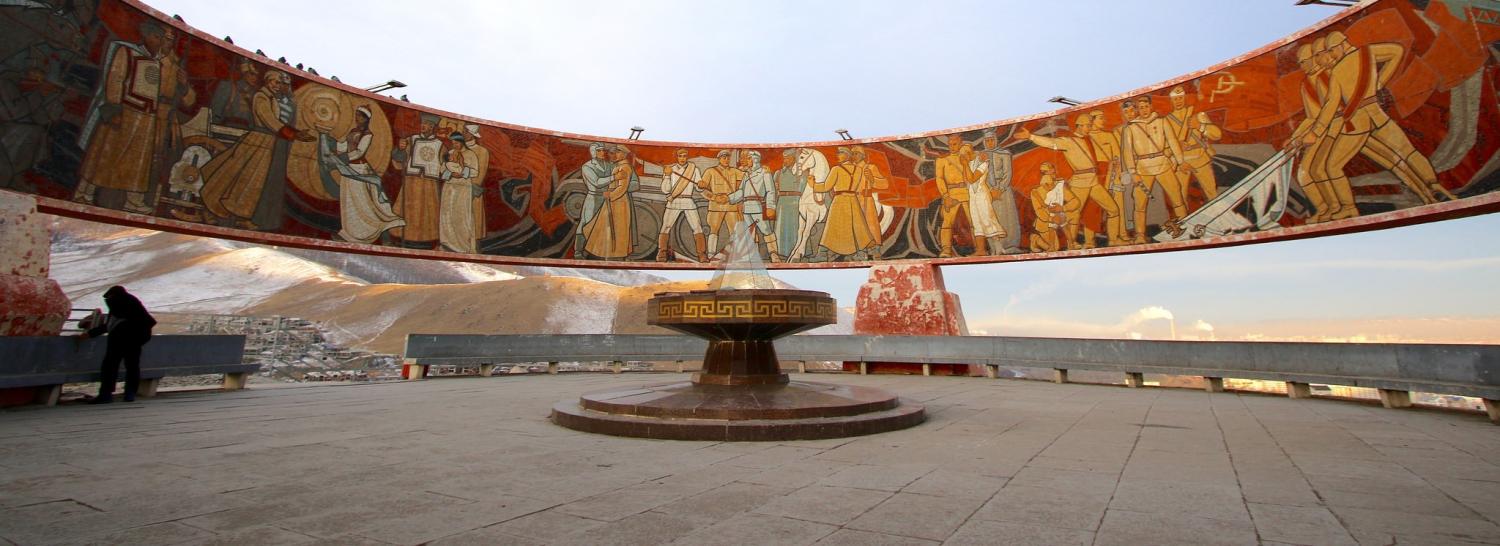Khlatmaaglin Battulga - a businessman, martial arts star, and the brains behind a famed, 40 metre high, stainless steel statue of Genghis Khan - became Mongolia’s fifth president this week, rising to power with a populist agenda that promised increased state control of the mining sector and skepticism about Mongolia’s economic dependence on China. Battulga defeated Miyeegombo Enkhbold, the candidate of the ruling party, and replaces the outgoing Tsakhiagiin Elbegdorj, who has ruled Mongolia since 2009.
While Mongolia has a wealth of natural resources, the election follows a period of slow growth and questionable economic management. Recently it accepted a $5.5 billion IMF bailout to sure up its economy - the fruits of which are yet to be felt by the majority of the population. So it was perhaps not a surpise the Mongolian electorate voted for change on 7 July.

Khlatmaaglin Battulga (centre) campaigning on 29 May 2017 (Photo: Asiarussia.ru - Creative Commons Licence)
Battulga’s victory is notable not only for his populist domestic agenda, but also his unequivocal foreign policy posturing. A Russophile, the incoming president went to great lengths to emphasise his pro-Kremlin attitude throughout his campaign, while downplaying the significance of Mongolia’s trade relationship with China.
Battulga’s pro-Russia agenda means his election is a significant win for Russian President Vladimir Putin, representing as it does a further proliferation of pro-Kremlin regimes in the states bordering Russia’s extensive frontier. While tensions still simmer between Russia and its neighbours in the Baltics and the Caucasus, Moscow has courted friendlier neighbours in Eastern Europe like Belarus and on its southern border with Central Asia, where most states remain firmly in the Russia-camp, despite increasing dependency on Chinese investment.
With Battulga now at the helm in Mongolia, the Moscow-Ulaanbaatar relationship looks set to deepen.
Mongolia might be seen as a bit player in the region: it has a relatively small population of three million (and an electorate around half that), and its GDP is only US$12 billion. Few observers view Mongolia as anything more than the birthplace of Ghenghis Khan who, while a vital figure in world history, lived almost eight centuries ago.
However, Mongolia's expansive territory - richly endowed with copper and coal - its embrace of the democratic process so unique to its region, and its geostrategic value, warrant more attention.
It is is an important physical buffer between Russia and China - two states with a checkered relationship, both aiming to solidify their own spheres of influences across Eurasia.
Should Battulga follow through on his anti-China campaign rhetoric, China may look to double down on its own border alliances elsewhere, including in North Korea - another vital buffer state that China sees as indispensable. In this regard, a waning relationship between Mongolia and China could have ramifications on the broader geopolitics of the region.
The Mongolian election represents not only a geostrategic gain for Vladimir Putin, but also may have served as an affirmation of Putin himself, with a desire for Putin’s brand of leadership seeming to have taken root in the imagination of the Mongolian electorate.
Enkhbayar Budeekhuu, head of the Mongolian Community Association in Australia and a supporter of the new president, believes Battulga will make a 'huge difference' and encourage development in the country. Budeekhuu also believes the similarities and ties between Battulga and Putin helped Battulga win, noting many in Mongolia wanted a president in the Putin mould. 'Everyone is saying [Battulga] is quite similar to Vladimir Putin - I think that’s the reason Mongolia chose him as the new leader for the next four years,' Budeekhuu said.
While some Mongolians want Putin’s style of leadership replicated in their own country, they are still invested in Mongolia’s democratic process. This is notable in a region dominated by authoritarianism. East Asian states like South Korea and Japan are democratic bastions but Mongolia’s two nearest neighbours are anything but. Additionally, the rest of the Russosphere - in which Mongolia is increasingly embedded - has a selective relationship with democracy, utilising questionable mandates merely as a way to bolster regime legitimacy.
Mongolians' faith in their electoral process may have been shaken, however, after an election that was marred by claims of corruption and dirty tricks. It was described by some analysts as ‘scandal plagued’ and the ‘worst’ election in Mongolia’s history. Considering the controversy, can the Mongolian people have certainty over the result?
According to Budeekhuu, ‘100 per cent’.

